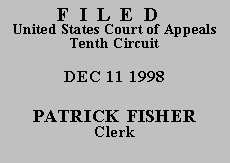

| MICHAEL JAMES MORRIS,
v.
STEVE HARGETT |
No. 98-6217
(D.C. No. CIV-98-106-A) |
Petitioner Michael Morris pled guilty to unlawful possession of cocaine and received a ten-year sentence in 1992. He appeals the district court's dismissal of his 28 U.S.C. § 2254 habeas corpus petition as untimely under the Antiterrorism and Effective Death Penalty Act of 1996 (AEDPA). We affirm.
In AEDPA, Congress added a one-year time limit provision for section 2254 federal habeas corpus petitions challenging convictions in state court. See 28 U.S.C. § 2244(d)(1). In those instances in which a petitioner's conviction became final prior to the effective date of AEDPA, we adopted a grace period within which to file a federal habeas petition. This grace period extends one year from the effective date of AEDPA, April 24, 1996, and expires on April 23, 1997. See United States v. Simmonds, 111 F.3d 737, 744-46 (10th Cir. 1997). In addition, ADEPA provides that "[t]he time during which a properly filed application for state post-conviction or other collateral review . . . is pending shall not be counted toward any period of limitation under this subsection." 28 U.S.C. § 2244(d)(2).
The magistrate judge recommended, and the district court held, that Mr. Morris' petition was untimely whether or not the AEDPA grace period would toll for state post-conviction proceedings. We have since held that the grace period is tolled during such proceedings. See Hoggro v. Boone, 150 F.3d 1223, 1226 (10th Cir. 1998). We therefore assess the timeliness of Mr. Morris' petition in light of Hoggro.
The grace period clock began running with respect to Mr. Morris' claim on the effective date of AEDPA. When Mr. Morris filed his first application for state post-conviction relief on March 13, 1997, the application suspended the clock, freezing it 41 days before the AEDPA grace period ran out on April 23, 1997. After Mr. Morris' state post-conviction proceedings concluded on June 17, 1997, the clock began to run again for the remaining 41 days, ending on July 29, 1997. Mr. Morris did not file his petition in federal court until January 1998, well past the tolled grace period.
Mr. Morris was thus too late, even with post-conviction tolling. He is therefore barred procedurally from filing a section 2254 petition, and he is not entitled to a certificate of appealability to pursue this barred habeas petition.
For these reasons, we DENY defendant's application for a certificate of appealability and DISMISS his appeal.
ENTERED FOR THE COURT
Stephanie K. Seymour
Chief Judge
*.This order and judgment is not binding precedent, except under the doctrines of law of the case, res judicata, or collateral estoppel. The court generally disfavors the citation of orders and judgments; nevertheless, an order and judgment may be cited under the terms and conditions of 10th Cir. R. 36.3.